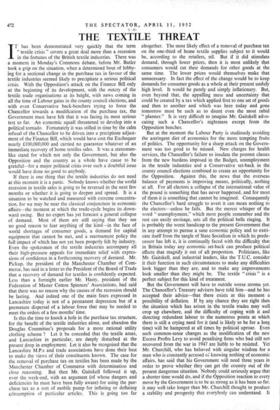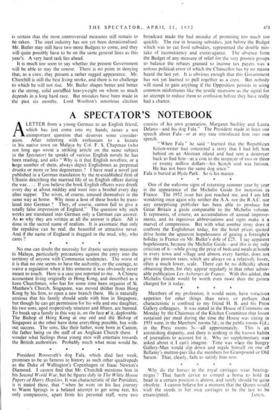THE TEXTILE THREAT
IT has been demonstrated very quickly that the term "textile crisis" covers a great deal more than a recession in the fortunes of the British textile industries: There was a moment in Monday's Commons debate, before Mr. Butler took a grip on the situation, when a determined bout of lobby- ing for a sectional change in the purchase tax in favour of the textile industries seemed likely to precipitate a serious political Crisis. With the Opposition's attack on the Finance Bill only at the beginning of its development, with the outcry of the textile trade organisations at its height, with news coming in all the time of Labour gains in the county council elections, and with even Conservative back-benchers trying to force the Chancellor towards a modification of the purchase tax, the Government must have felt that it was facing its most serious test so far. An economic squall threatened to develop into a political tornado. Fortunately it was stilled in time by the calm refusal of the Chancellor to be driven into a precipitate adjust- ment of the Finance Bill, which would have cost the Exchequer nearly £100,000,000 and carried no guarantee whatever of an immediate recovery of home textiles sales. It was a statesman- like stand for which not only the Government, but also the Opposition and the country as a whole have cause to be grateful—for a major political crisis over such a doubtful issue would have done no good to anybody.
If there is one thing that the textile industries do not need at this moment it is a panic. Nobody knows whether the world recession in textile sales is going to be reversed in the next few months or whether it is going to deepen and spread. It is a situation to be watched and measured with extreme concentra- tion, for we may be near the classical conjuncture in economic affairs—the moment at which the trade-cycle begins its down- ward swing. But no expert has yet forecast a general collapse of demand. Most of them are still saying that they see no good reason to fear anything of the kind—in the face of world shortages of consumer goods, a demand for capital equipment that cannot be met, and a rearmament policy the full impact of which has not yet been properly felt by industry. Even the spokesmen of the textile industries accompany all their high-pressure appeals for immediate relief with expres- sions of confidence in a forthcoming recovery of demand. Mr. Pickup, the president of the Manchester Chamber of Com- merce, has said in a letter to the President of the Board of Trade that a recovery of *demand for textiles is confidently expected. Less than a fortnight earlier Mr. Hasty, president of the Federation of Master Cotton Spinners' Associations, had said that there was no reason why the causes of the recession should be lasting. And indeed one of the main fears expressed in Lancashire today is not of a permanent depression but of a premature dispersal of a labour force that may be needed to meet the orders of a few months' time.
Is this .the time to knock a hole in the purchase tax structure, for the benefit of the textile industries alone, and abandon the Douglas Committee's proposals for a more rational utility clothing scheme ? Let it be conceded that the textile areas, and Lancashire in particular, are deeply disturbed at the present drop in employment. Let it also be recognised that the Lancashire M.P.s and trade associations have done their best to make the views of their constituents known. The case for the removal of purchase tax on textiles has been made by the Manchester Chamber of Commerce with determination and close reasoning. But then Mr. Gaitskell followed it up, over the week-end, with an argument (of whose dangers and deficiencies he must have been fully aware) for using the pur- chase tax as a sort of mobile pump for inflating or deflating ccInsumption of particular articles. This is going too far altogether. The most likely effect of a removal of purchase tax on the one-third of home textile supplies subject to it would be, according to the retailers, nil. But if it did stimulate demand, through lower prices, then it is most unlikely that consumers would cut their demands for other goods at the same time. The lower prices would themselves make that unnecessary. In fact the effect of the change would be to keep demands for consumer goods as a whole at their present unduly high level. It would be purely and simply inflationary. But, even beyond that, the appalling mess and uncertainty that could be created by a tax which applied first to one set of goods and then to another and which was here today and gone tomorrow must be such as to daunt even the most rabid "planner." It is very difficult to imagine Mr. Gaitskell advo- cating such a Chancellor's nightmare except from the Opposition benches.
But at the moment the Labour Party is studiously avoiding the astringent diet of economics for the more tempting fruits of politics. The opportunity for a sharp attack on the Govern- ment was too good to be missed. New charges for health services, the Chancellor's failure to insulate the poorest classes from the new burdens imposed in the Budget, unemployment in the textile industries and a Conservative set-back in the - I county council elections combined to create an opportunity for the Opposition. Against this, the news that the overseas balance of payments is improving means, politically, nothing at all. For all electors a collapse of the international value of the pound is something that has never happened, and for most of them it is something that cannot be imagined. Consequently the Chancellor's hard struggle to avert it can mean nothing to the electors—unless he fails. But the merest whisper of the word "unemployment," which most people remember and the rest can easily envisage, sets all the political bells ringing. It is probably the worst handicap to the present Government that in any attempt to pursue a sane economic policy and to extri- cate itself from the tangle of State Socialism in which its prede- cessor has left it, it is continually faced with the difficulty that in Britain today any economic set-back can produce political effects that magnify it out of all proportion. Politicians, like Mr. Gaitskell, and industrial leaders, like the T.U.C. consider it their function in such circumstances to make any difficulties look bigger than they are, and to make any improvements look smaller than they might be. The textile " crisis " is a perfect subject for this kind of treatment.
But the Government will have to outride worse storms yet. The Chancellor's Treasury advisers have told him—and he has accepted their advice—that there exists at this moment a possibility of deflation. If by any chance they are right then the situation which has arisen in the textile trades may well crop up elsewhere, and the difficulty of coping with it and directing redundant labour to the numerous points at which there is still a crying need for it (and is likely to be for a long time) will be hampered at all times by political uproar. Even such common-sense changes as the modification of the new Excess Profits Levy to avoid penalising firms who had still not recovered from the war in 1947 are liable to be resisted. Yet Mr. Churchill, who has behaved with singular wisdom for a man who is constantly accused cc; knowing nothing of economic affairs, has said that his Government will need three years in order. to prove whethcr they can get the country out of the present dangerous situation. Nobody could seriously argue that a shorter time would do, and if the Opposition reaction to every move by the Government is to be as strong as it has been so far, it may well take longer than Mr. Churchill thought to produce a stability and prosperity that everybody can understand. It
is certain that the most controversial measures still remain to be taken. The steel industry has not yet been denationalised. Mr. Butler may still have two more Budgets to come, and they will quite possibly have to be on the same general lines as this year's. A very hard task lies ahead.
It is much too soon to say whether the present Government will be able to stay the course. There is no point in denying that, as a crew, they present a rather ragged appearance. Mr. Churchill is still the best living stroke, and there is no challenge to which he will not rise. Mr. Butler shapes better and better as the strong, solid unruffled heavyweight on whom so much depends in a long hard race. But mistakes have been made in the past six months. Lord Woolton's notorious election broadcast made the bad mistake of promising too much too quickly. The rise in housing subsidies, just before the Budget which was to cut food subsidies, represented the double mis- take of inconsistency and extravagance. The absence from the Budget of any measure of relief for the very poorest groups to balance the rebates granted to income tax payers was a serious political error of which the Chancellor has by no means heard the last yet. It is obvious enough that this Government has not yet learned to pull together as a crew. But nobody will stand to gain anything if the Opposition persists in using common misfortunes like the textile recession as the signal for an attempt to reduce them to confusion before they have really had a chance.



































 Previous page
Previous page